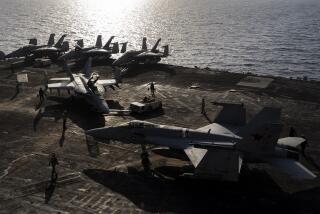Role Unchanged, Navy Chief Insists : Defense: Maritime superiority must be maintained, Adm. Trost says, regardless of cutbacks in the Army and Air Force.
WASHINGTON — As the Army and Air Force struggle to redefine their missions to adapt to a radically new world, the Navy stoutly believes that its role has not changed and its goal of global maritime superiority cannot be abandoned, the service’s senior officer said Monday.
Adm. Carlisle A. H. Trost, the chief of Naval Operations, said in an interview that the United States needs a large, modern and overseas-based Navy to counter a continuing Soviet threat as well as challenges from smaller nations, drug traffickers and terrorists.
The Navy has global responsibilities ranging from protection of sea lanes for commerce to military support of allies in Asia, Europe and Latin America, Trost noted in an interview.
Despite what he dismissed as “euphoria” over the extraordinary changes in Eastern Europe and the Soviet Union, “the demand for naval forces doesn’t change very much,” the four-star admiral said.
Trost said budget cuts are forcing the Navy to retire dozens of aging ships ahead of schedule, trim manpower and scale back exercises. But he insisted that mastery of the seas remains a vital national goal and that the Navy cannot afford to cut deeper and still meet its commitments.
The Navy’s reluctance to reevaluate its role at a time of historic changes was noted pointedly last week by Sen. Sam Nunn (D-Ga.), chairman of the Senate Armed Services Committee.
At a committee hearing attended by Trost and the other three military service chiefs, Nunn said that the Navy appeared unwilling to respond to a changing world. “The Navy has to take another look at its requirements,” Nunn said. “Who are you going to be protecting? This change in Europe has to affect the Navy.”
Trost acknowledged in the interview Monday that the Soviets have dramatically curtailed naval deployments outside of their home waters, but he said the United States planned no corresponding reduction in so-called “out-of-area operations.”
“That’s not our philosophy,” he said.
Trost said that the roles of the Army and the Air Force are significantly affected by the diminished likelihood of war in Europe, where those services now station a combined total of 305,000 troops. But Trost contended that the Navy’s mission is changed little as a result.
Many of the forces now based on the ground in Europe will soon be coming back to the United States as a result of a conventional forces pact under negotiation with the Soviets. Partly in response, overall troop strength in the Army and Air Force will shrink by 83,000 men and women from 1989 through 1991. During the same period, Navy manpower will be reduced by only 8,000, according to Pentagon figures.
Trost said that the Navy’s role will grow, rather than shrink, in the new security environment arising from the collapse of the Warsaw Pact and the Soviet Union’s turning inward to confront longstanding economic and social problems.
Even as Moscow draws back from Central Europe, it continues to improve its fleet, including new missile-launching submarines, aircraft carriers and surface ships. The Soviets are scrapping scores of older ships and pursuing a “very, very heavy modernization program,” Trost said.
While Soviet ships are spending fewer days at sea, the Soviet Navy is conducting complex exercises near Soviet ports and making provisions for launching ballistic missiles from submarines safely tied up at the pier, Trost said.
“The Soviet Union is still the only country with the potential to wipe us from the face of the earth,” the admiral said. “We’d be rather imprudent if we didn’t take the Soviet naval threat into account.”
He also cited proliferation of high-technology weapons in the Third World, sophisticated terrorist groups and well-armed drug smuggling cartels as growing threats to the United States. Trost noted that the Navy had been called into action more than 200 times since the end of World War II, with only a handful of those deployments involving the Soviet Union or its satellites.
At the same time, U.S. access to overseas naval and land bases is being increasingly challenged, forcing military planners to rely more and more on seaborne forces, he said.
Citing Spain, Greece and the Philippines, all of which have raised objections to continued U.S. military presence on their soil, Trost predicted that the “we don’t need you any more” philosophy will spread.
“That trend is unlikely to reverse,” he said. “We are going to need to rely on forward flexible forces” that only the Navy can provide.
Trost expressed concern that the Philippines would eject the United States from its six bases in that nation, including the sprawling Subic Bay Naval Base, a key installation supporting the large Navy fleet in the Pacific and the Indian oceans.
Washington and Manila are entering negotiations over the bases against a backdrop of a Communist insurgency, a fierce power struggle within the government of President Corazon Aquino and growing anti-American sentiment among the populace.
“The political trend now is to really hammer the United States in hopes it will lead to more money” in rental for the bases, Trost said.
More to Read
Sign up for Essential California
The most important California stories and recommendations in your inbox every morning.
You may occasionally receive promotional content from the Los Angeles Times.










